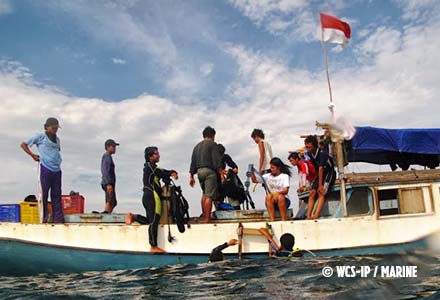
By: Effin Muttaqin and Stuart Campbell
To enlist public support for an important cause—say sustainable fishing—sometimes you first have to give a little. This is how in the Java Sea’s Karimunjawa Marine National Park, WCS facilitated a set of incentives-based conservation agreements between the national park authority and local fishers.
In return for supporting the park zoning regulations by village laws and cessation of destructive fishing practices, communities have received support from the government for their grouper mariculture enterprise. This is happening in the context of communities’ participation in the development of local village laws and management plans that align with the park authorities zoning laws (spatial fishery closures, e.g. No Take Areas), fishing gear restrictions, and restrictions associated with tourism and mariculture).
Now, underwater surveys by WCS scientists are showing that the approach is paying off.
Community support for park zoning regulations does not necessarily eliminate conflict among fishers. The use of traditional gears such as spearguns by some fishers has resulted in conflict with those fishers who use handlines. Spearguns can be used to efficiently target reef fish species, leading to their depletion.
They also compete with (and negatively impact) species targeted by handline fishers. The main targets for both spear fishers and handline fishers are species from the Family Serranidae or Groupers. In 2011, the handline fishers of Karimunjawa village resolve to find a solution to this conflict and developed agreements with spear fishers that were targeting vulnerable species they believe were being depleted.
With support from WCS, in 2012 an agreement was reached among fishers and fish traders to regulate the fishing of groupers in traditional fishing zones. An agreement between handline fishers and speargun fishers is now village law, ratified by the district government. The agreement prohibits speargun fishers from catching Squaretail Coralgrouper (Plectropomus areolatus), Camouflage Grouper (Epinephelus polyphekadion), and it also prohibits traders from buying these species from spear fishers.
The other 3 villages in Karimunjawa are now following this lead, and in 2013 the village of Nyamuk (mosquito in Indonesian) initiated a similar set of regulations for its village waters.
WCS helped to draft a management plan, which details the regulations and this is now to be ratified by the district government of Jepara.
Building on this success, in Karimunjawa a range of co-management approaches are now supported by the government, which delivers improved community participation in park governance and provides economic incentives to reduce fishing pressures. Even more encouraging is the stabilization of reef fish biomass in some areas since 2010.
➢ Want more? Read a WCS study on incentives that have improved management effectiveness in the online version of the journal Marine Policy (Campbell et al. 2013).